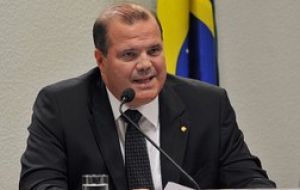MercoPress. South Atlantic News Agency
Brazil en route to comply comfortably with budget planned primary surplus
 Alexandre Tombini, “Brazil needs to ‘treasure’ its sound fiscal position”
Alexandre Tombini, “Brazil needs to ‘treasure’ its sound fiscal position” Brazil’s budget primary surplus widened in July to a record for the month pushing the year-to-date total to almost 80% of the government’s 2011 target, according to the Central bank.
The primary surplus, which includes federal and local governments as well as state companies, rose to 13.8 billion Real (8.6 billion dollars) from 13.4 billion Real in June.
Brazil needs to “treasure” its sound fiscal position and strive to maintain it, even if the economic climate becomes more “challenging” said last week central bank President Alexandre Tombini who suggested possible lower rates.
The central bank’s forecast that inflation will slow to the mid-point of its target range next year assumes that President Dilma Rousseff’s government will hit its target of a 117.9 billion Real primary surplus this year. The central bank targets inflation of 4.5%, plus or minus two percentage points.
“I have been saying that we need to retain that strength now more than ever” Tombini recently told journalists adding that “we need to make sure that we are in the very same situation when this new phase of the financial turmoil is over.”
The central government posted a primary surplus of 10.9 billion Real, while regional governments posted a 1.6 billion Real surplus and state companies had a surplus of 1.2 billion Real. The primary surplus in the first seven months of the year was 92 billion Real, or 78% of the government’s target for the year.
Including interest payments, the budget had a fiscal deficit of 5 billion Real in July, compared with 5.6 billion Real in June, the central bank said.
Net debt was 39.4% of GDP in July, the lowest since March 2009 and down from 39.7% in June. The decline in the debt-to-GDP was largely due to the weakening of the Real against the dollar, which raises the value of Brazil’s dollar assets, said Tulio Maciel, head of the central bank’s economic research department.
The central bank forecasts a debt-to-GDP ratio of 38.9% in August, Maciel told reporters in Brasilia.




Top Comments
Disclaimer & comment rulesCommenting for this story is now closed.
If you have a Facebook account, become a fan and comment on our Facebook Page!